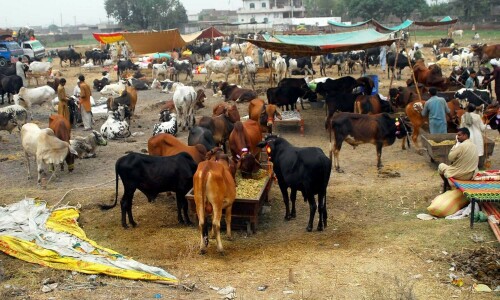NEW DELHI, Aug 24: India’s ruling Hindu nationalists were on a collision course on Saturday with President Abdul Kalam, asking him to change his mind on a thorny electoral decree which critics claim allows politicians to cover up their criminal pasts.
Kalam, the architect of India’s arsenal of guided and ballistic missiles, earlier this week had returned the ordinance on electoral reforms, seeking clarifications on certain provisions of the government-proposed presidential decree.
Prime Minister Atal Behari Vajpayee’s Hindu nationalist BJP-led coalition government refused to budge and a meeting of his cabinet Saturday decided to send the ordinance back to Kalam with a request that he sign on the dotted line.
Human rights groups say the proposed ordinance would cover up criminal records of politicians, who currently cannot contest elections if they have been formally convicted of criminal offences.
They also argue that if Kalam is forced to enforce the decree politicians, many of whom have criminal backgrounds, will also not be obliged to disclose their assets.
Constitutional provisions stipulate that the president is obliged to offer his assent if an ordinance — which does not have financial implications — is referred back to him by the federal government.
Officials hinted that Vajpayee’s cabinet chose the constitutional path to coerce Kalam to issue the ordinance without making changes.
The need for a presidential ordinance to amend India’s electoral laws arose when a draft law on the subject set for introduction in parliament on August 12 could not be carried out as the national house adjourned ahead of schedule.
“The union cabinet has expressed the view that the president will be requested to give his assent to the promulgation of the ordinance pertaining to electoral reforms,” government spokeswoman N.J. Krishna announced.
“The cabinet considered the issues raised by the president regarding the proposed ordinance for the amendment of the Representation of People’s Act, 1951,” she said of the draft law which had been cleared by Vajpayee’s government on August 6.
An ordinance issued by the president remains in force for six months and then it is either endorsed as law by the bicameral parliament or rejected in a vote.
Referring to the ping-pong game raging between Kalam and the government, Krishna argued the cabinet decided to seek presidential assent because the draft electoral reforms law could not be introduced in parliament in time.
She also insisted that there were no disputes as the proposed ordinance was a mere “replica” of the draft law that had been forged through a political consensus.
“The cabinet recalled the backdrop against which the bill was framed on the basis of total political consensus and the 4proposed ordinance is only a replica of (that) bill...” Krishna said.—AFP












































